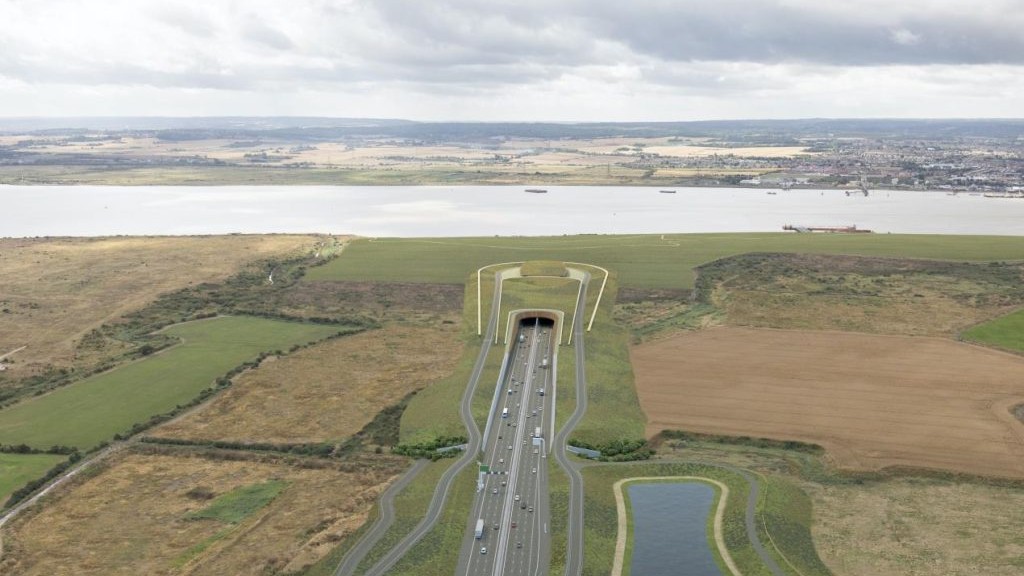The Lower Thames Crossing conundrum
'Symbol of Britain's sclerotic planning system' finally gets green light after years of delays – but at what cost for locals and the Treasury?

A free daily email with the biggest news stories of the day – and the best features from TheWeek.com
You are now subscribed
Your newsletter sign-up was successful
Ministers have finally given the green light to the Lower Thames Crossing, ending years of delays and false starts.
The scheme, which will connect Kent and Essex, has become a "symbol of Britain's sclerotic planning system", said the Financial Times (FT).
What is it?
Described by National Highways as "the most significant road project in a generation", the 14.5-mile road and tunnel project linking Essex and Kent is "aimed at reducing congestion on the Dartford Crossing by nearly doubling road capacity across the Thames east of London", said The Independent.
The Week
Escape your echo chamber. Get the facts behind the news, plus analysis from multiple perspectives.

Sign up for The Week's Free Newsletters
From our morning news briefing to a weekly Good News Newsletter, get the best of The Week delivered directly to your inbox.
From our morning news briefing to a weekly Good News Newsletter, get the best of The Week delivered directly to your inbox.
This will include two 2.6-mile tunnels under the Thames, which would be "the UK's longest road tunnels".
One official said the project would be a "key strategic route" for drivers, freight and logistics, improving connectivity between southern England and the Midlands and unlocking regional economic growth.
What's the hold-up been?
Tuesday's announcement by Transport Secretary Heidi Alexander was "16 years in the making, with the project first mooted in 2009", said the BBC.
More than £1.2 billion has already been spent on planning, consultations, traffic modelling, environmental assessments, legal and advisory fees and land purchases, despite construction not yet having started.
A free daily email with the biggest news stories of the day – and the best features from TheWeek.com
The FT said the planning document for the project "runs to 359,070 pages, equivalent to nearly 300 times the complete works of William Shakespeare".
Originally costed at between £5.3 billion and £6.8 billion when it was first agreed in 2017, it is currently forecast to cost around £10 billion. Barring any further hold-ups, work on the tunnel is expected to begin next year and it is scheduled to open in 2032.
Why is it controversial?
The Lower Thames Crossing "has seen many controversies along its now 20-year lifespan", said New Civil Engineer.
Last October, residents of Thurrock, Essex, told the BBC the plans have been "looming" over them for years, leaving them unable to sell their homes and move.
Thurrock Council leader John Kent said the proposals "would do nothing to improve congestion locally or regionally and would add little capacity to the national strategic road network".
He added that the tunnels would, however, "cut Thurrock in two, severing communities, bring huge amounts of pollution to the borough, but bring no discernible benefits for local people".
The project has also faced a number of "legal threats" from environmental groups, The i Paper reported. "Conservationists claim several developments that are central to the Government's growth agenda" – including the Lower Thames Crossing – "do not take into consideration new laws designed to improve England’s protected national park and landscapes."
National Highways has promised to build "the UK's greenest ever road", but environmental groups have "raised concerns over the destruction of ancient woodlands and habitats for wildlife".
There has also been fierce debate about how the project will be funded, with the government "yet to decide what method of private finance to use", said the FT.
A proposal to have a "regulated asset base" model – in which private investors would collect road toll revenues to pay back their investments over the life of the projects – is "favoured by the Treasury, according to people with knowledge of the discussions".
This option – which would require nearly £2 billion of taxpayer funding to attract £6.3 billion of private investment – would cost the Treasury £200 million more in upfront costs than if the government paid for the scheme directly, according to a recent National Highways document.